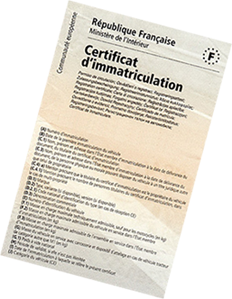Importing and registering a vehicle in France
- Why import a vehicle?
- How do I register my vehicle in France?
- What documents are necessary to carry out my request for vehicle registration in France?
- How is the cost of my registration certificate calculated?
Why import a vehicle?
Since 1 January 1996, the approval and registration of vehicles manufactured for the European market have been simplified by the introduction of the “community type-approval” procedure.
Since then, it has been possible to compare the prices, equipment, options and versions of vehicles in one country in the European Economic Area to those in another in order to buy the vehicle of your dreams. For new and second-hand vehicles, as for other products sold in the European area, there are big differences in prices between members of the European Union.
These differences are due partly to car manufacturers’ marketing strategies and partly to high taxation regimes imposed in certain countries.
However, for a new registration to take place smoothly, it is important to take a few precautions during the purchase and to know your rights and the costs involved. It is therefore essential to be informed beforehand and to be vigilant at every stage of the purchase process: before, during and after.
- Before the purchase:
- Establish your budget, taking into account the purchase, maintenance, insurance, and the cost of the French carte grise (certificate of registration).
- Make a list of your criteria: type of car, brand, model, type of fuel, colour, equipment and alternatives
- Check the vehicle’s first country of origin. For vehicles imported from within the European Economic Area, the administrative procedures do not generally pose any great difficulties, however it is quite another matter for vehicles imported from a country outside the European Union
- During the purchase:
- Meticulously examine the general condition of the vehicle:
Exterior: bodywork, paintwork, wear on the tyres, wheel rims etc.
Interior: condition of surfaces, operation of equipment etc. Under the hood: appearance of the engine block, battery, check the oil and water levels etc., check the presence of the manufacturer’s plate which is generally positioned in the engine compartment or on the uprights of the doors. The manufacturer’s plate will allow you to check if the vehicle has been manufactured for the European market. This plate should give the European approval number (the famous e*) which will allow you to register the vehicle easily - Perform a road test, with a view to trying as many different driving situations as possible and be attentive to the vehicle’s reactions: engine speed, braking, road holding, acceleration etc. Also, remember to check the dashboard display and the mileage, and do not hesitate to ask the vendor questions
- Regarding documentation, check that the vendor has the vehicle’s full registration certificate (sometimes there are two parts, as in Germany or Spain), a recent MOT or equivalent (less than 6 months), the vehicle’s maintenance logbook, its insurance and, if possible, maintenance invoices
- Meticulously examine the general condition of the vehicle:
- After the purchase:
- Insure the vehicle
- Obtain the certificate of cancellation of the vehicle’s registration depending on the country of purchase (necessary in Germany, for example)
- Ask for transit plates depending on the country of purchase (necessary in Belgium and Germany).
Note: Transfer plates are generally valid for five days after their purchase - If you are transporting the car on a trailer, you do not need transit plates, but you should include this cost in your purchase budget
- Declare your vehicle in France within a period of 15 days after the purchase at your local tax office
- You have one month from the date of purchase of the vehicle to start the registration process, either by making the request yourself on the Agence Nationale des Titres Sécurisés (ANTS) website, or by asking a registered professional to do it for you. After completing the ANTS request, you will be able to download the provisional registration certificate for your vehicle
Warning: You must be in possession of a provisional registration certificate in order to use your vehicle in France while you wait for the full certificate
Furthermore, in the event that you are moving or returning from abroad, you may wish to import your vehicle on your return. Once again, make sure you find out about the cost of insurance, the costs of exporting your vehicle and the costs for its registration in France.
The European Consumer Centre France has published a brochure entitled ‘Buying a car in Europe’ that offers guidance and information about your rights and obligations. In the case of importing your vehicle, it is best to contact the registration service in the country where you wish to register it in order to know exactly what steps need to be taken.
How do I register my vehicle in France?
Once you have imported your vehicle, the next step is to register it.
Since 6 November 2017, the process for obtaining a new carte grise is carried out online via the Agence Nationale des Titres Sécurisés (ANTS) website; this agency is responsible for the implementation of the Vehicle Registration System (SIV) in France:
All requests for cartes grises are now therefore made on the ANTS site or through a registered automobile professional. Applications are processed by the new Centres d’Expertises et de Ressources des Titres (CERT). Five of these platforms – which are not open to the public – were set up in 2017 to process applications for registration certificates: in Amiens, Besançon, Poitiers, Nîmes and Clermont Ferrand.
This new online service is not yet fully functional and still has a few bugs that you should not let discourage you! According to the Ministry of the Interior, everything should be resolved by the summer of 2018.
It should be noted that the problems with the ANTS site tend to affect private individuals, and not the agencies approved by the Ministry of Transport that carry out the request for a registration certificate for you.
What documents are necessary to carry out my request for vehicle registration in France?
The documents that will need to be scanned to carry out the request for a new registration via the ANTS website are the following:
- Proof of residence less than six months old
- A cerfa n° 13750-05 request for a vehicle registration certificate
- If there has been a change in the holder of the registration certificate: the invoice or transfer certificate (cerfa n°15776-01), or other proof of sale (with a translation provided by a certified translator if in a foreign language)
- The previous vehicle registration certificate, or equivalent official document if it is kept by the authorities of the country of origin (e.g. the international certificate for motor vehicles)
- A tax discharge (certificate of vehicle acquisition issued by the tax services), unless the request for registration bears a dispensation issued by the tax services
- Note 1: if the vehicle is less than 6 months old and/or has done less than 6,000 km, French VAT must be paid at the rate of 20% even if the VAT in the country of origin was paid at the time of purchase, and a refund of the VAT initially paid in the country of origin requested
- Note 2: For vehicles imported from a country outside the EU, it is also necessary to pay the customs duties and taxes that apply to the vehicle’s value excluding tax which is shown on the purchase invoice (increased by the costs of transport)
- Proof of a French contrôle technique (MOT) or equivalent performed in a European Union country less than 6 months ago
- If you are making the request on behalf of someone else: a signed mandate (cerfa n°13757-03) and a document proving the identity of the principal (preferably a driving licence if a physical person)
If the previous foreign registration certificate cannot be provided, or does not include all the technical information necessary for the registration, additional supporting documentation corresponding to your situation must be provided.
In order to know if it is necessary to provide a certificate of conformity in order to carry out the request for a French carte grise for your vehicle imported from a country in the European Union or the European Economic Area, you must examine the fields D1, D2, D3 and K of the registration certificate very closely.
Field D1 corresponds to the vehicle manufacturer, field D2 to its Type, Variant, Version, D3 to its commercial name and K to its European approval number. Since European Union registration certificates are standardised, these fields are listed but not always completed in full. If they are completed in full, you do not normally have to provide the Certificate of Conformity (COC) when you request a new registration in France.
Note: Switzerland, although part of the European Economic Area, does not use the K fields on its registration certificates, thereby making it necessary to provide a European Certificate of Conformity for the vehicle in order to register it in France.
- A European Certificate of Conformity issued by the manufacturer, in a language other than French as applicable
The certificate of conformity or COC is an administrative document that is standardised across Europe and which is issued by the manufacturer and is unique to the vehicle.
It indicates the vehicle’s technical characteristics, including the EC type, and ensures the conformity of the latter to European safety and pollution regulations. Its content is defined by EU directive in Annex IX to Directive 92/53.
Note: A COC cannot be issued for a vehicle that does not have EC type approval. This is the case for vehicles originally intended for the U.S., Japanese or other markets, vehicles that have been exported and then registered in a non-European country, vehicles prior to the establishment of European standards, and modified vehicles.
The Certificate of Conformity is a European document whose language is determined by the manufacturer or its official representative in the country where the vehicle was put into service. The certificate may therefore be in any EU language and remains valid as such in all EU countries. This point is embodied in French legislation in the Decree of 9 February 2009 relating to the procedures for vehicle registration, amended by the Decree of 25 June 2015 – Annex I – 3.1. Certificates of conformity – point c).
or
- A certificate of identification with an EU type if the imported vehicle is prior to the establishment of the European standards
The French identification certificate concerns all vehicles manufactured and registered in a country in the European Union or in the European Free Trade Association before the implementation of EC types. This is the case:
- for private vehicles manufactured before 1996
- motorcycles manufactured before 2004
- utility vehicles manufactured before 2010
The French identification certificate, also called the certificate of identification with a French national type or attestation of conformity, is an official document which replaces the COC only for the registration of your vehicle in France and is always issued in French by the manufacturer or their official representative in France. It contains the vehicle’s technical specifications which confirm that it has received national approval due to its CNIT code (National Identification of Type Code) in association with its type, variant and version (TVV).
It contains the vehicle’s technical specifications which confirm that it has received national approval due to its CNIT code (National Identification of Type Code) in association with its type, variant and version (TVV).
The French identification certificate can be full or partial. If the vehicle type has not been approved in France, then it will be partial. This is the case, for example, when a vehicle has technical characteristics that are different from the one approved in France.
- Full certification, registration can take place with the authorities as simply as if the vehicle had a COC.
- Partial certification or red strike-through or description with red strike-through; you will have to compile a registration application from this document on a single-approval basis in consultation with the DREAL (Regional Department for Environment, Development and Housing) or the DRIRE (Regional Department for Industry, Research and the Environment) in your region, who will inspect your vehicle for compliance with French standards. Once this single vehicle approval has been obtained, you will be able to finalise your registration.
or
- A Réception à Titre Isolé (RTI) (Single Vehicle Approval) report issued by a Regional Department for Environment, Development and Housing (DREAL); if the model of the imported vehicle was not approved in France, or if the vehicle is imported from a country outside the European Union, you will need a certificate of non-compliance from the manufacturer or their official representative in France
To obtain the report, you first need to complete a single vehicle approval application, and then send it to the DREAL, DRIEE, DRIRE or DEAL in your region.
If your application is approved, an appointment will be proposed and a vehicle inspection visit will enable the compliance of your vehicle to be verified with the French Highway Code. On this occasion, your vehicle should be in perfect mechanical order, perfectly clean and equipped in accordance with the regulations. The manufacturer’s plate, the serial number (stamped on the chassis or body) will need to be located and cleaned, as will the identification plate or engine number.
During this visit, you will need to present your notification of the appointment, the originals of the official documents and, possibly, invoices for any repairs.
If your vehicle is approved as complying with the Highway Code and its subsequent texts, then an approval report and a receipt will be issued. This receipt should be added to the documents required to complete the registration formalities indicated above and will enable you to obtain your registration certificate.
Warning: On the ANTS site, the supporting documents must not be larger than 1 Mb per document.
How is the cost of my registration certificate calculated?
- the date when the vehicle was first put into service
- its taxable horsepower
- its emissions of carbon dioxide (CO2)
- Warning: imported second-hand vehicles will be regarded as new and therefore subject to the ecological bonus/malus scale with a discount according to the age of the vehicle
- your department of residence
- the registration management tax
- the delivery tax
If you wish to add any information to this article, share your personal experience or obtain additional information, please leave a comment














